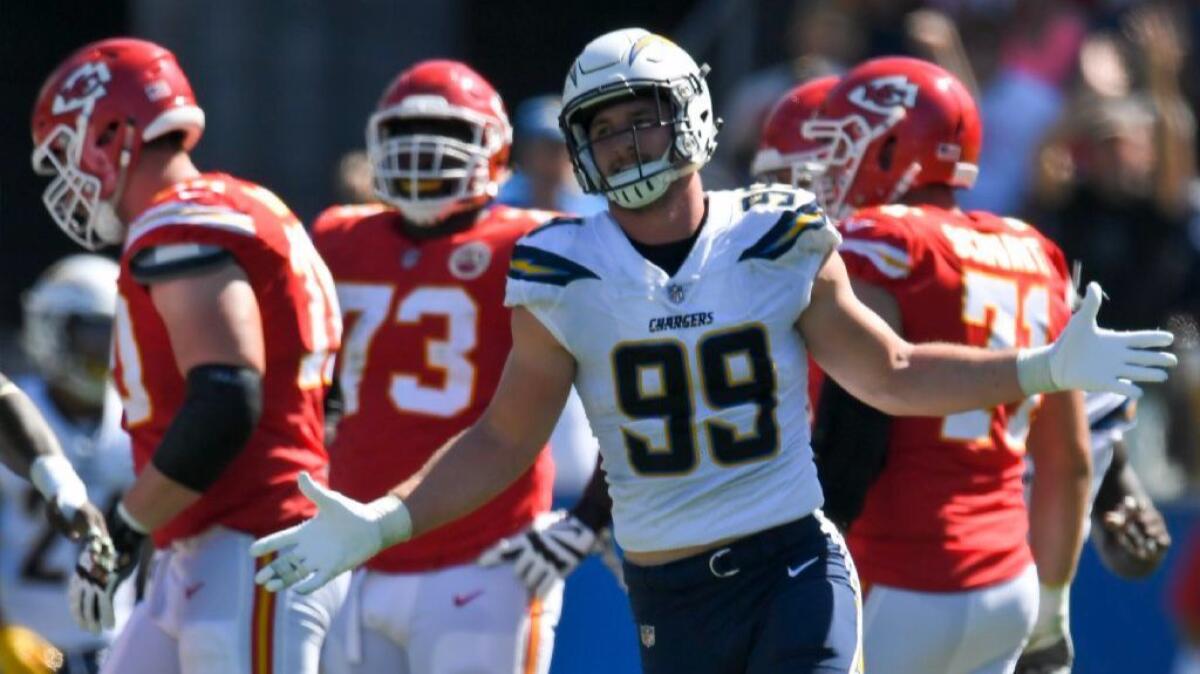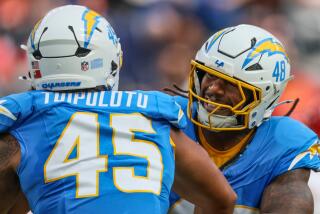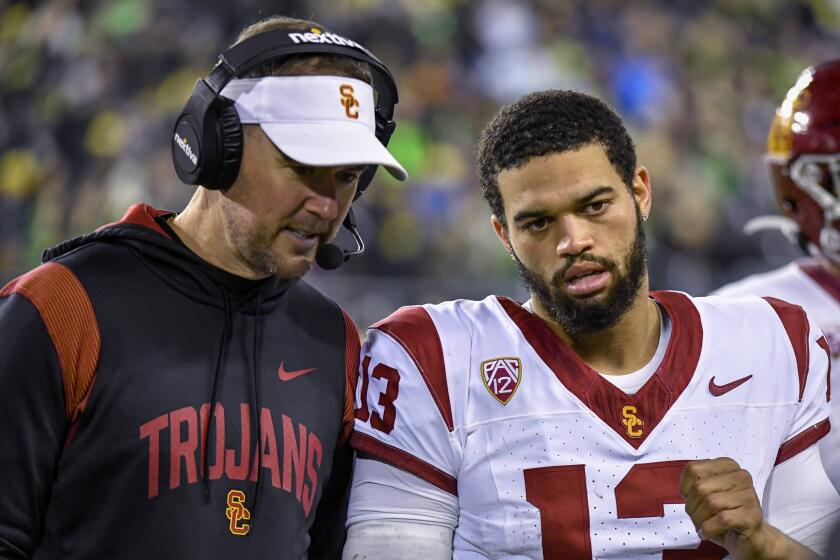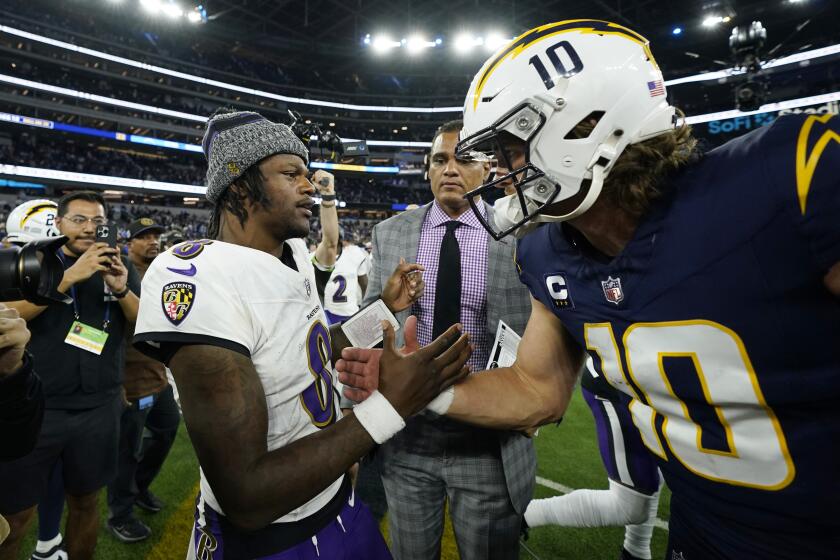Chargers are ‘pinning their ears back’ and putting pressure on opposing offenses

If an offensive lineman had his way, his team would never pass. The quarterback would just hand off the football time after time after time.
Run blocking is a proactive move — the ball is snapped and you attack the defender, trying to create space. The offensive linemen know where they’re supposed to go, who they’re supposed to plow out of the way. And, if something goes wrong, it’s usually for a minimal loss.
But imagine, even at well over 6 feet 5 inches tall and more than 300 pounds, knowing that you were about to be all alone, tasked with stopping a rabid beast hell-bent on destroying the person you’re supposed to protect. And you’ve got to do it while you’re trying to take steps backwards.
If you get beat, everyone knows. And if it goes really wrong, you’ll see the quarterback, the most important player on the field, flattened on the turf.
“It’s stressful as [expletive],” Chargers guard Kenny Wiggins said.
And despite being winless in three games this season, the Charger defense is at least imposing healthy amounts of stress on the opposition. And everyone, in some way, is trying to stay out of that position.
The goal of offenses, on a micro level, is to keep the defense off guard and guessing. But when teams struggle to move the ball on first and second down, they end up in obvious passing situations and defenders get to “pin their ears back” and rush the quarterback.
It’s a phrase used by virtually everyone in football even if no one really knows what it means.
“That’s why Google’s there,” ear-pinning defensive end Joey Bosa said, reaching for his phone.
But it turns out, the search engine isn’t a tremendous help. Most definitions of the phrase have negative connotations, equating getting your ears pinned back with a one-sided drubbing, a scolding or a forced submission. The British use it in instances where people need to “pin their ears back” and pay attention.
But that’s not how Chargers defensive coordinator Gus Bradley uses the phrase.
Bradley, like everyone else in football, uses the phrase in a way that can probably best be traced back to animals, who sometimes pin their ears back when they’re about to show aggression. For the Chargers’ defensive line, there’s no better chance for that than on third-and-long.
“I think that’s one of the strengths of our defense, obviously, is our edge rushers and our interior rushers. … Everybody would like to be in third and long when you have those because they can pin their ears back and get it going,” Bradley said. “So that’s the whole objective — to do well enough on first and second down to get those third and long.”
The hope is the Chargers can force Philadelphia into those third-and-long situations as they did last week against the Chiefs.
When the Chargers were tough on first and second down or when Kansas City was a good bet to throw, Bradley was able to put his four best pass-rushing linemen on the field at once — defensive ends Bosa, Melvin Ingram and Chris McCain and defensive tackle Corey Liuget as the primary ear-pinners.
“When we can get people in obvious passing situations, then we can put our best on the field,” Chargers coach Anthony Lynn said. “We can run games. [It’s] speed. They’re athletic. [It’s] power. There are so many things you can do with them in passing situations.
“I love it.”
Lynn has to really love what he’s getting out of Ingram, who is on a different level than everyone else on the field, even as he’s surrounded by other top-notch pass rushers.
A part-time rapper, a part-time lineman and a full-time character, Ingram’s already has 5.5 sacks this season after he got to Alex Smith three times Sunday. On one of those sacks that came on third down, Ingram lined up inside of Bosa on the left side of the line, easily blowing past an oversized and athletically overmatched guard and running untouched for a sack.
His play in the team’s first three games earned him AFC Defensive Player of the Month.
Ingram missed the bulk of the team-sanctioned offseason workouts as he negotiated a long-term, $66 million contract with the team, and if you’d think that he’d come back with his pockets too fat and his work ethic out of shape, you’d be wrong.
Lynn said Ingram seemed even more motivated after getting his new contract, and the reason, Ingram said, comes from an important life lesson.
“The man who sleeps on the floor can never fall out of bed,” Ingram said.
The philosophy comes from either comedian Martin Lawrence or from author Robert Gronock depending on your Google (Ingram credits Lawrence), and speaks to a humility he’s tried to keep as a football player.
“No matter who’s in, I feel like everyone can do it all on our line,” Ingram said.
Everyone on the ear-pinning line has that feeling — at least about their unit. Bosa said it wasn’t that big of a deal — just four guys who can get to the quarterback because that’s their job. McCain, a journeyman who has found a home with the Chargers, said the group doesn’t sense a pending momentum shift when they line up next to each other.
“It’s just what we do,” McCain said. “Any other play feels the same.”
But if you talk to the guys tasked with stopping players such as those four, it’s clear it’s not the same.
The Chargers can move Bosa, Ingram, Liuget and McCain around in all kinds of combinations, confusing offensive linemen already unhappy with the prospect of pass blocking. It makes preparation even more intense because a lineman can’t just study Bosa or Ingram — they have to prepare for the whole group.
It’s not ideal. It’s bleeping stressful, even.
It’s why the linemen on the offensive side don’t mind the contact in the run game. That’s their turn to hit. That’s their turn to push. That’s their turn to dictate things. And, you’d better believe they’d rather be doing that than trying to stop someone such as Ingram when those ears get pinned back.
“Yeah,” Wiggins said as his fellow linemen laughed at the obviousness of it all, “you could say that.”
Follow Dan Woike on Twitter @DanWoikeSports
More to Read
Go beyond the scoreboard
Get the latest on L.A.'s teams in the daily Sports Report newsletter.
You may occasionally receive promotional content from the Los Angeles Times.








